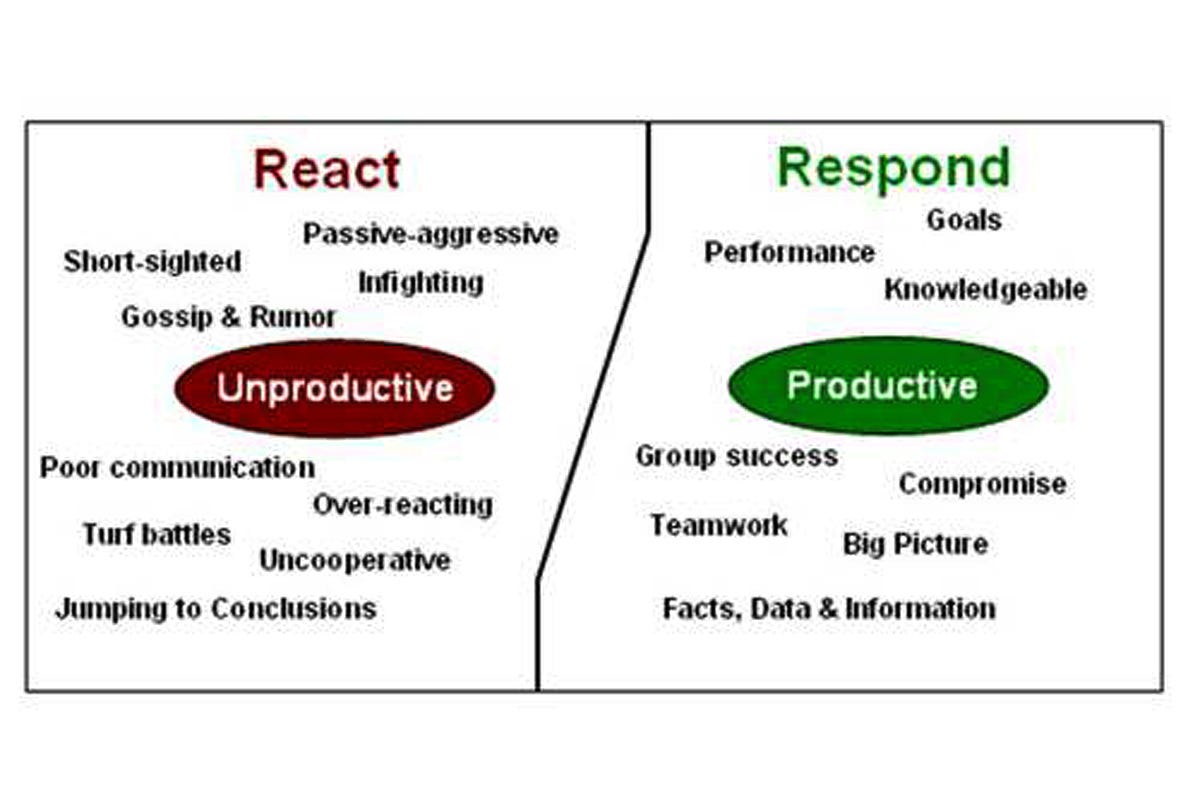Reacting Versus Responding
Learning the difference...
This post was a request from a reader asking me to address the difference between reaction and response in a given situation. Apparently that this is a pretty common thing to explore in anger management courses, and I can understand why. I see many people react before they have all the information regarding whatever has raised their ire. Being wired as I am this isn’t something that I personally have ever experienced, but certainly, I have seen it in a variety of places, be they in direct relationships or in observing humans in general. I think that if a person is the sort that reacts first in general, they likely are the same when it comes to people that are close in their lives, and that can come with a lot of fallout.
Have you ever been in a conversation with someone and you say something seemingly innocuous, but their reaction is like you shot their dogs and set their house on fire? Most people have experienced this, and most people are rather perplexed when it happens. However, those very same people are just as likely to have that same reaction if something is said to them that runs afoul of their beliefs.
I find this is a common occurrence with hot-button conversation topics, certainly things like religion or politics, but you can find it with people when you accidentally hit one of the areas of their lives that they haven’t given much thought to their position on the matter, it just feels a certain way to them and whatever you said doesn’t support their narrative.
Being psychopathic, and observing those around me, I find this to be a very common occurrence that is directly tied to emotions, not logic. Often if you question the reaction, you will be met with vitriol or anger. This is reacting, not responding. Instead of hearing what you have to say in the context of it possibly being new information, they hear only that you might have another opinion on a matter, and they are driven by their emotions to counter you.
This is something you will see in relationships frequently. I think that the reason this might be is because people assume that those closest to them agree with them, or at the very least understand them, with no discussion necessary. Once you live with someone for an extended period of time, whether they are your parents and siblings, or a live-in spouse or partner, there is a tendency to assume that you are in sync in certain ways. Sometimes, when that is called into question, there can be problems.
When confronted with something uncomfortable, many people respond with the emotions that present themselves at that moment. They don’t stop to consider whether those emotions are warranted, if they are reacting to what the person actually said or meant, or if perhaps they aren’t being informed by those emotions to provide an appropriate thought process. That is, assuming that there is a thought process to begin with, and not simply a gut reaction.
This is the difference between reacting to something, which is emotional in nature and often is a bit over the top, and responding to it, which means that you hear what they have said, understand the context either because you remained calm while listening, or because you asked the appropriate questions to clarify their meaning. The first is a pretty normal retort, the second takes a lot more practice. It is also the difference between perhaps believing the first thing you are told, and having a skeptical eye that allows you to take in the information, but not put it down in the law book of truth.
You will also find this behavior in people that believe a certain narrative. An example would be something like the Moscox Idaho student murders. Many people online were convinced that one of the student’s ex-boyfriends was the culprit and went for him viciously without there being a good reason to believe that it was him. When there aren’t answers, people will try to fill in the blanks with what makes them most comfortable or what makes the most sense to them at the time.
This is pretty typical human instinct and it is one that companies have run experiments on people to see which emotion causes people to most likely share a story, regardless of whether or not the story is true. Do you know which emotion could most reliably predict a story being shared? Rage.
This is why when there is a big news story I always suggest waiting for at least a few days before buying into anything the mainstream press is saying. They rely on people reacting, they are not interested in people who respond instead of having an emotional opinion on what they are peddling at the moment. If you have the ability to step back and not buy the hype that they are pushing, you will find that a great number of the stories are at the very least about eighty percent incorrect if not outright fabricated.
The press has a two-fold money-making scheme that they are using your reactions to perpetuate.
First, they are going to tell you a story. It is going to be ridiculous because I want it to be clearly unhinged. At midnight, all fluffy bunny rabbits become little vampires that will sneak into your house and suck all the fluid out of your vegetables. Your gardens aren’t safe, and neither is your fridge. For those of you wondering, yes, this is from the book, Bunnicula.
This story, as ridiculous as it is, is going to get a lot of clicks. People are naturally going to think, there is no way this is true, let me look into it. So they click the link, and the news site gets ad revenue from you clicking on it. Then, a few days go by, and they print a “correction” which explains that, actually, there aren’t vampiric bunnies, but rather someone mistook the white asparagus that they had accidentally planted for green asparagus that had its “blood” drained out of it. The story had been… less than factual. However, the original story is never taken down, and the “correction” is also supported by ad revenue, so they are getting paid twice for the same nonsense story.
Another issue is that a lot of people never see the correction, so the vampiric bunny story is still considered a factual story for many people that only saw the first article. They emotionally react to it, and that reaction became what defines reality for them. This is true in all sorts of situations, to react to something instead of considering it first. It is most likely to happen in highly charged emotional situations, of course, like arguing with a loved one, and wanting to be right instead of wanting to be happy. Anger can make people totally unable to listen to another person.
I wonder if the environment that people are being subjected to in general is translating to their personal relationships more often than perhaps in the past. It seems to be the case that people will treat those closest to them the poorest because they know that they can get away with a lot more than they will be able to with strangers. Those that you are close to are expected to be forgiving of bad behavior which grants permission in many people’s minds to take their life frustration out on those that they should be kindest to. Perhaps I am incorrect, but it would make sense to me.
If you find yourself being one of the types that are prone to an emotional reaction in front of the ability to consider something logically, I wonder if you are able to take a step back and evaluate things in hindsight and see if your emotional response was correct or if quelling the initial internal reaction might have produced a better outcome for you?
Something that I have observed is those who react first tend to have very unsettled personal lives. I can’t imagine that being a winning strategy but then again, strategy is a considered thing, and reactions are not. If this is something that you struggle with, perhaps on occasions that you are reading an article or hearing a news story that prompts you to have a reaction, practice taking a step back and make note of that story, then see where the story ends up in a week. Was your reaction correct or are you finding more often than not that waiting was a better option before having any sort of opinion on the matter?
Given enough time doing this and weighing if you’re doing the best thing for yourself, you will be able to start considering this in your personal life as well. It is a matter of making it a habit of allowing the emotion to pass without giving it power and allowing your logic to take over and evaluating things as they are, not how your limbic system tells you they are.
Reaction versus response. It can truly make your life easier to live and help you be a happier person overall.



the part about the press reminded me of the song 'dirty laundry' by don henley. very accurate.
so once again i believe this might explain something i've consistently been confused about with people. i like to question things on both sides (maybe to death, and i realize that), before i ever fully come to a conclusion when i'm presented with information about anything. "isn't what my friend did to me awful?" "well, did you do something to upset her? what was going on?" or, "how about this new political candidate, he sucks right?" "i haven't researched up on him yet. i need to listen to some of his speeches and read back on his consistency before i come to a decision." "but he's for XYZ? how can you not hate him?"
i have never understood why people get so upset about this. i haven't heard it explained like this and framing it as react vs. respond makes a lot of sense.
do you think reacting would be more common than responding towards a person oblivious of a lot of social cues? i'm also wondering why responding pisses people who have a tendency to react off so much. is it because they want you to react with them?
good post👍🏼
"It is a matter of making it a habit of allowing the emotion to pass without giving it power and allowing your logic to take over and evaluating things as they are, not how your limbic system tells you they are."
That's a core Buddhist concept, Athena, and well said.
This article also made me think of Kevin Spacey, and his being cleared of all charges in two trials. Now, I have no doubt that Spacey is a difficult man. He had a horrific childhood according to his brother. He must have made a lot of enemies. Plus, there are always those wanting to jump on the bandwagon for money. But, before his trials, he was fired from House of Cards. He was dropped from projects he was contracted to perform in. There was a knee jerk reaction against him. Despite two courts finding him innocent, it will be a daunting task to recover his career, if that's even possible. Personally, I think that he's one of the greatest actors alive, so this is probably a great loss over nothing, or very little.